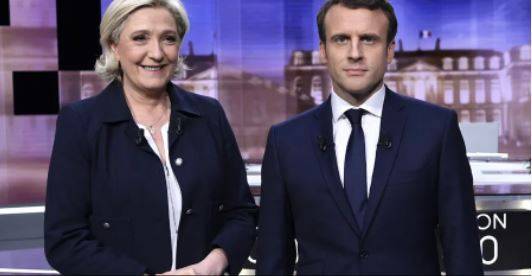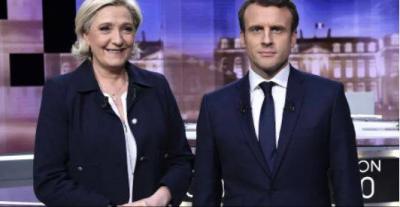Russian gas has become central to the French electoral battle in both the first and second rounds between President Emmanuel Macron and far-right candidate Marine Le Pen. In the first round, which concluded with Macron leading Le Pen and the elimination of 10 candidates, the French president expressed his hope for a halt to imports of Russian gas in response to what he described as "war crimes" committed by Moscow in the Ukrainian town of Bucha. France imports much of its natural gas through pipelines from Russia, using it for residential and commercial energy supplies.
During the election campaigns, Russian gas served as a pressure point and propaganda tool, exploited by Macron to garner sympathy from his supporters, as well as by Le Pen. Despite facing criticism for her support of Russia, the far-right candidate stated, "I do not want the French to suffer the consequences of decisions aimed at ending oil or gas imports, as the sanctions on Russia would raise energy costs in our country." Le Pen added that she "understands what it means to impose a ban on gas or oil in terms of energy costs for the French."
Despite her opposition to sanctions targeting the energy sector, Marine Le Pen supports all other punitive measures against Russia. Most analysts believe that the second round will act as a referendum on the rise of the French right to power. However, the war in Ukraine has turned those expectations upside down, with experts predicting it may damage Le Pen's campaign, which had previously praised Russian President Vladimir Putin, according to U.S. network CNN.
According to observers, Macron's statements about halting gas imports are unrealistic and used as an electoral card, given that Paris relies on Russian gas to cover more than 46% of its needs. The European Union is experiencing a rift among its members over whether to impose sanctions against Russia that include the oil and gas sector, with the reality that the bloc heavily depends on Russian energy. French European Affairs Minister Clément Beaune stated that France is concerned about increasing dependence on Moscow due to the Russian gas project "Nord Stream 2." Beaune added, "As President Macron said, there is concern regarding this project because it strengthens dependence on Russia."
French affairs expert Nasser Zahiri noted that the difference in percentages between Macron and Le Pen in the first round is not reassuring, and that the far-right candidate has tried to exploit Macron's mistakes regarding domestic economic policies. She focused on the purchasing power of the French people and the country's high inflation rate, giving her some advantage in the first round. He adds to Sky News Arabia that, "Despite doubts about her victory, it is expected that Marine Le Pen will achieve significantly better results than in the 2017 elections, which is a worrying indicator of French voter sentiments."
Zahiri affirms that "the war in Ukraine has acted as a lifeline for Macron, as it overshadowed his presidential campaign and portrayed him as a president concerned with the country's foreign affairs. However, he must not be complacent, not just to win a second term but to enhance the margin between him and the far-right candidate." He considers that "a Le Pen victory would be an economic, social, and political earthquake not just for France but for the entire European Union."
Regarding Macron's remarks on Russian gas, political economy professor Karim El Omda indicated that they came within the context of election propaganda and the exploitation of the Ukrainian issue to gain voter support, especially since France plays a crucial role in the diplomatic negotiations of the current crisis. He added to Sky News Arabia that "Europe will not be able to forgo Russian oil imports anytime soon, as its reliance on Russia exceeds more than 50% of its daily needs."
### French Plan Against Russia
The French Economic Analysis Council has devised a plan against Russia that may be stronger than a ban on Moscow's gas, according to experts. The council, affiliated with the French Prime Minister's office, stated in a recent study that imposing hefty tariffs on Russian energy imports at the European Union level could be more effective than a complete ban, even though a full ban would have limited effects on most countries, according to Reuters.
The council explains that the new tariff could allow smaller, more vulnerable countries to continue receiving some Russian gas imports, while halting imports to larger, less vulnerable nations that could more readily substitute them. French Economy Minister Bruno Le Maire stated that gas prices will be frozen in France until the end of 2022 for consumers, according to AFP. He noted that Paris relies on Russian gas for 20% of its supplies and mentioned that "its production from biomass, sewage, and biogas could help achieve independence from Russian gas."
The second and final round of the French elections is scheduled for April 24.




